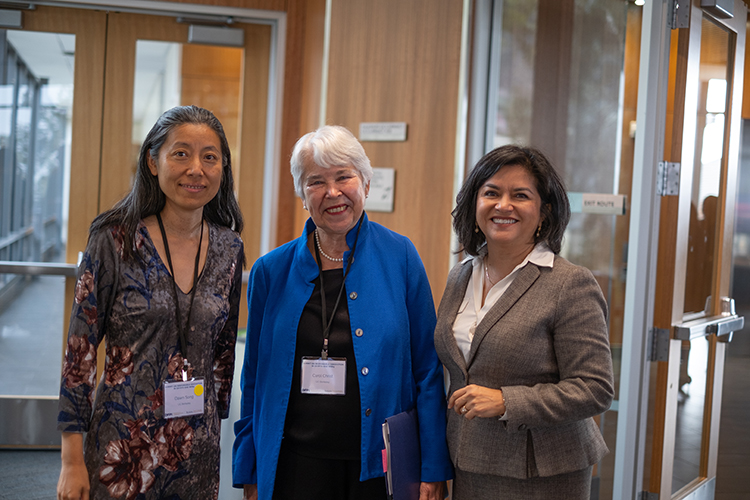Berkeley web3 and crypto summit tackles financial inclusion, climate issue
Crypto industry leaders, scholars, government and consumer groups collaborate on blockchain policy and regulations
October 10, 2022

Crypto industry leaders, scholars, government and consumer groups collaborated on blockchain policy and regulations at a summit last week hosted by Berkeley’s Center for Responsible, Decentralized Intelligence and the California Department of Financial Protection and Innovation. (UC Berkeley photo by Julian Meyn)
How do we incentivize the use of climate-friendly blockchains? Should lawmakers play a key role in creating opportunities for underserved communities via crypto assets and Web3? And what can the crypto asset industry do to ensure wealth-building opportunities are accessible to historically excluded communities?
All of these questions and more were discussed at a summit about “Responsible Innovation in Crypto and Web3” held at UC Berkeley last week. The conference brought together industry leaders, government officials, faculty experts, consumer advocates and investors to collaborate on and discuss innovative solutions to tough problems in the blockchain and web3 industry.
Web3 is an idea for a new iteration of the World Wide Web that incorporates concepts such as decentralization, blockchain technologies and token-based economics.

Chancellor Carol Christ spoke at the summit. (UC Berkeley photo by Julian Meyn)
Berkeley is a “hotbed of innovation” and the perfect place for this discourse, Chancellor Carol Christ said last Wednesday, as she welcomed the group of leaders.
“This is a university committed to approaching society’s challenges and opportunities from every conceivable angle,” Christ said. “We take great pride in the role our campus community plays in sustaining California’s leadership when it comes to fostering and shepherding emerging technologies without ever losing sight of the public’s interest.”
Crypto assets are digital assets — where transactions are verified and maintained by blockchain networks of decentralized nodes and operators— that focus on principles of no reliance on central trust, immutability and self-sovereignty.
But the systems these assets operate in are not as regulated as traditional currency, leaving many to wonder what their full impact is on the economy and investors.
Wednesday’s summit consisted of three panels that delved into understanding the environmental impacts of crypto assets, identifying ways to increase access to responsible and innovative crypto products for underserved Californians, and how to foster blockchain investment and wealth in historically underserved communities.

Left to right: Berkeley RDI Co-Director Dawn Song, Chancellor Carol Christ and Secretary of the California Business, Consumer Services and Housing Agency Lourdes Castro Ramírez. (UC Berkeley photo by Julian Meyn)
Panelist and Berkeley alumnus Ezra Garrett, who helps run an A.I.-powered digital banking platform, said financial technology, or fintech, companies must commit to creating a connection between the growth of their businesses to the financial health of the communities they serve.
Having the summit on campus, Garrett said, “is wonderful validation” of Berkeley’s continued leadership in the state.
“Being at the front edge of emerging technologies and finding ways to orient those emerging technologies toward solving problems for the underserved is absolutely in the DNA of this institution,” he said.
Held at Chou Hall in Berkeley’s Haas School of Business, the all-day summit was co-hosted by Berkeley’s Center for Responsible, Decentralized Intelligence (RDI) and the California Department of Financial Protection and Innovation (DFPI). More than 60 leaders in industry, academia and government attended and included California State Treasurer Fiona Ma and Secretary of the California Business, Consumer Services and Housing Agency Lourdes Castro Ramírez.

“We are all committed to building an inclusive stakeholder engagement process as we work to provide greater regulatory certainty,” Ramírez said. (UC Berkeley photo by Julian Meyn)
Berkeley RDI is a multi-disciplinary, campus-wide initiative focusing on web3 and decentralized technologies. Classes offered by RDI have educated nearly 1,000 students in blockchain/web3 at Berkeley. RDI has also led the world’s first Massive Open Online Course (MOOC) in decentralized finance and entrepreneurship in web3 with thousands of students participating from over 30 countries. RDI’s Berkeley Blockchain Xcelerator has incubated 85 teams from around the world that have raised more than $450 million in follow-on funding.
Last month, Coindesk, a news site specializing in digital assets, recognized Berkeley as the No. 1 university in the U.S. for blockchain for the second year in a row.
“Berkeley RDI is working to enable a responsible digital economy with a deep emphasis on ‘responsible,’” said Dawn Song, a Berkeley professor and RDI co-director. “Our campus has a community of changemakers that are committed to the mission of ensuring that the future of Web3 serves the greater good.”
Berkeley Chief Innovation and Entrepreneurship Officer Rich Lyons said California — with the world’s fourth largest economy — cannot fall behind other states in developing innovations and opportunities to grow the state’s economy through Web3 and blockchain technology.
The summit ended last Wednesday with attendees sharing recommendations and actionable solutions that included a focus on improving the public’s financial education and literacy by making industry knowledge accessible. Attendees also felt it was important to find incentives for clean crypto mining — the process of creating new digital coins — and avenues for better disclosure of blockchain energy use.
A set of minimum standards for crypto companies to follow across their accounting, cybersecurity and risk management policies was another recommendation the group reported out.
California DFPI Commissioner Clothilde Hewlett, who previously served as the executive director of the Cal Alumni Association, spearheaded the summit and concluded the evening, saying the group’s conversations and recommendations will help inform the state’s regulatory approach to responsible crypto innovation for “the betterment of society.”
“Our approach will encourage the kind of innovation that is part of the DNA of this great state and of this university,” said Hewlett. “And this is not the end. This dialogue will continue.”